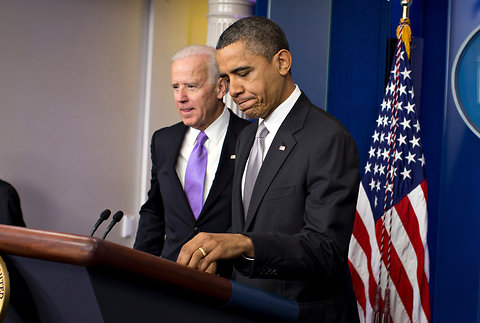 Evan Vucci/Associated Press President Obama, joined by the vice president, spoke with reporters on Wednesday afternoon.
Evan Vucci/Associated Press President Obama, joined by the vice president, spoke with reporters on Wednesday afternoon.
3:34 p.m. | Updated The harshest judges of those in news media are often others in the news media, and, with the benefit of Twitter, that intrajournalistic watchdog role can be performed simultaneously with the journalism being criticized.
Case in point was the White House news conference on Wednesday afternoon, when President Obama made a forceful announcement in response to the massacre of children last week in Newtown, Conn. He said he was directing Vice President Joseph R. Biden Jr. to lead an effort “to come up with a set of concrete proposals” about dealing with gun violence that he would submit to Congress no later than January.
“We are going to need to work on making access to mental health care as easy as access to a gun,” Mr. Obama said. “We’re going to need to look more closely at a culture that all too often glorifies guns and violence.”
His words, after five days of extensive news coverage and national debate, were intensely focused on gun violence. He addressed no other topics. Yet judging by the questions that followed his address, most of the members of the Washington press corps had other things on their minds.
“I’d like to ask you about the other serious issue consuming this town right now, the fiscal cliff,” was the first question, from The Associated Press’s correspondent, Ben Feller.
Mr. Obama answered. Then came the next question, again about the so-called “fiscal cliff”: “What is your next move?” Then: “You mentioned the $700,000, $800,000 — are you willing to move on income level?” And so on, for at least 15 minutes, before a question about gun violence was finally asked, by David Jackson of USA Today.
Media watchers on Twitter — mainly other members of the media and some whose job it is to watch it — quickly seized on the questions as a sign that the Washington press corps was out of step with the national agenda.
Unbelievably, there hasn’t been a single question about guns at Obama’s press conference about GUN CONTROL yet.
including follow-ups, DC press has now asked FOUR tax questions, ZERO gun questions so far. #NRA
White House press corps message to the world: ‘We don’t care about gun control’. Shameful.
Change of plan: the reporter who said, “Mr. President, getting back to the gun issue…” is the new Person of the Year.
In a statement, Sally Buzbee, The A.P.’s Washington bureau chief, defended her reporter’s line of questioning.
“I think it was perfectly fine for A.P. White House correspondent Ben Feller to pose a question about the fiscal cliff,” Ms. Buzbee said. “The president had just spoken at length about gun control, but had not yet said a word about the other huge issue of the day affecting the nation, the fiscal cliff. We ask questions intended to ensure that big news is covered. We do this all this time. We aim to cover the uncovered ground.”
It wasn’t long, however, before the criticism spread throughout the wider Twitterverse and became a meme in itself. People proposed, tongue in cheek, other topics for questions in lieu of gun control under the hashtag #DCPressQuestions.
Mr. President, what do you think about last night’s “The Voice” finale? #DCPressQuestions
Mr. President, who do you like better? Spiderman or Batman? #DCPressQuestions
This post has been revised to reflect the following correction:
Correction: December 19, 2012
An earlier version of this post incorrectly identified the reporter who was first to ask President Obama about gun violence. It was David Jackson of USA Today, not Jake Tapper of ABC News, who later also asked about gun violence.